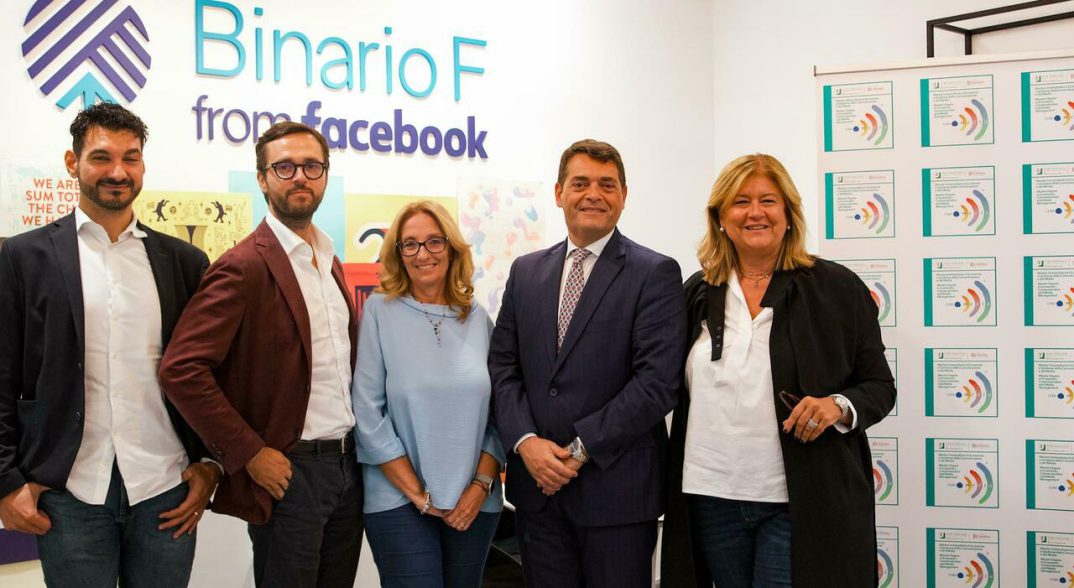The talk AI REVOLUTION: IMPACTS ON MARKCOMM took place yesterday in Rome, on the occasion of the ROME FUTURE FESTIVAL. Experts from the sector and top managers from large national and international companies such as Simonetta Pattuglia, Director of the Master’s in Economics and Management of Communication and Media at the University of Tor Vergata, Paola Aragno, Vice President of Eikon Strategic Consulting, Carmine Esposito, Chief Sales Officer & Partner at Justbit, Diego Chiavarelli, Strategic Deal Maker Italy at Capgemini, Clemente Zard, Managing Director at Vivo Concerti, Nicola Dambrosio, Client Manager, Creative and AI Expert at Kantar Italia, Antonio Iannamorelli, Director of Government Affairs at Telsy, and Emanuele Mazzi, Innovation Director at Uniting, participated in the event.
Organized by the Master’s in Economics and Management of Communication and Media of the UNIVERSITY OF ROME TOR VERGATA in collaboration with Eikon Strategic Consulting and Justbit, the meeting, introduced and moderated by the Master’s Director Prof. SIMONETTA PATTUGLIA, was an opportunity to conduct an in-depth analysis of new trends in AI, to engage with sector experts and top managers from large national and international companies, with a particular focus on corporate communication, new technological platforms such as social media, generative AI platforms, and other revolutionary algorithms.
“Yesterday’s meeting, among other things, provided a truly exhaustive overview of marketing and communication experiences that respond to integrated strategies and the integration of AI into business processes,” explained Professor Pattuglia. “Processes through which businesses can enjoy numerous benefits, such as greater predictive capacity and the ability to innovate and adapt to market changes, by implementing methodologies that allow agility and responsiveness to changes, while promoting a corporate culture that encourages experimentation.”
The talk was also an opportunity, along with Professor Pattuglia and her guests, to try to establish the “perimeter” that the digital landscape can offer organizations where performance marketing techniques, including digital marketing, content marketing, programmatic advertising, and social media marketing, are transforming the ways of interacting with various types of audiences through powerful tools that effectively and personalizedly reach specific targets: “For this reason, at this historical moment, it is crucial for companies to train their staff on the use of AI and new applied technologies, creating interdisciplinary teams capable of combining marketing and data science or forming partnerships with companies specialized in AI with access to cutting-edge technologies and new ideas,” continued Professor Pattuglia. “AI completely transforms marketing, media, and communication, and as it continues to grow and improve, it will continue to transform these fields. This is why, especially for companies, it is essential to always adapt, to be proactive in adopting AI and its technologies, adapting strategies, processes, and skills where necessary, to remain competitive and capable of embracing new opportunities.”
Immediately after the introductory moment by Professor Pattuglia and the thanks to the participants by CARMINE ESPOSITO, Chief Sales Officer & Partner at Justbit, the various guests took turns on stage, sharing their experiences on the subject with the participants.
PAOLA ARAGNO, Vice President of Eikon Strategic Consulting, spoke about how we are still far from AI and social media content: “We risk feeding a lot of sensitive data to a junior collaborator who is able to produce standard posts but cannot fully grasp not only the specifics of the platform but also the company’s communication style and tone of voice.”
DIEGO CHIAVARELLI, Strategic Deal Maker Italy at Capgemini, delved into how AI is revolutionizing marketing: “Soon our virtual assistants will interact with companies on our behalf. It is time for businesses to adapt and embrace this new era.”
CLEMENTE ZARD, Managing Director of Vivo Concerti, is still strongly attached to the analog dimension of the live entertainment sector: “Despite artificial intelligence offering enormous opportunities to improve the management and promotion of concerts, the essence of live is in the unique, physical, and unrepeatable experience. We constantly strive to work with our partners to ensure that technological progress enhances the live experience, making it more accessible and engaging. However, AI can support but not replace that human contact and emotional connection that make a concert unforgettable. The future of live will certainly be enhanced by technology but will always remain deeply rooted in the authenticity of the encounter between artist and audience.”
NICOLA DAMBROSIO, Client Manager, Creative and AI Expert at Kantar Italia, spoke about how “meaningfully different brands have an advantage in using AI, but marketers must remember that effectiveness should never be sacrificed for efficiency, and the human touch remains fundamental in creative personalization.”
ANTONIO IANNAMORELLI, Director of Government Affairs at Telsy, argued that “Artificial Intelligence represents a challenge whose dimensions we have yet to fully understand. As history teaches us, every time a major innovation is available to those working for the progress of humanity, it soon becomes available to malicious actors as well. Preparing for the era of Artificial Intelligence, like that of Quantum Computing, therefore means primarily investing in cybersecurity.”
Closing the afternoon, just before the Q&A session and the conclusion of the works, once again led by Professor Simonetta Pattuglia, was EMANUELE MAZZI, Innovation Director at Uniting: “AI is increasingly the driving force behind martech, enabling personalized strategies, automating complex operations, and offering predictive insights that allow brands to connect with consumers in a more authentic, timely, and meaningful way.”
“In conclusion,” says Professor Pattuglia, “the impact of AI on business functions is becoming deeper, with significant implications for customer and stakeholder management, product development, and the operational efficiency of all business functions. The massive adoption of AI is paving the way across all industrial sectors and business functions, particularly for an epochal transformation in marketing and communication, with highly innovative applications and significant improvements in the customer experience. Integrating AI into business strategies is therefore now considered ‘essential’ to remain competitive in a rapidly changing market. On the other hand, more and more voices – which the Professor shares – are rising to continue urging researchers, managers, operators, professionals, and university students not to leave the field open solely to technology and instead to keep a strong focus on humans, their capabilities, and their emotional and sentimental needs, in a high-tech high-touch approach that remains the only possible key for an evolved and human society.”
© ALL RIGHTS RESERVED
This article is automatically translated



